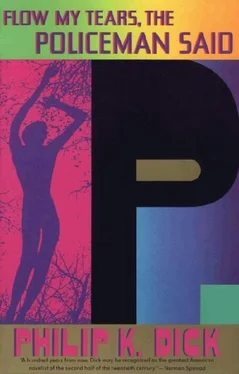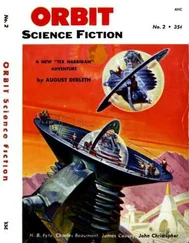“Is there anything else you can cut or tear off me?” Jason inquired.
“They tried—Peg, who is a police technician expert at it, tried—to stick a voice tap on your gullet. But I don’t think she got it to stick.” Cautiously, she explored his neck. “No, it didn’t catch; it fell off. Fine. That takes care of that. You do have a microtrans on you somewhere; we’ll need a strobe light to pick up its flux.” She fished in the glove compartment of the quibble and came up with a battery-operated strobe disc. “I think I can find it,” she said, setting the strobe light into activity.
The microtrans turned out to be in residence in the cuff of his left sleeve. Alys pushed a pin through it, and that was that.
“Is there anything else?” Jason asked her.
“Possibly a minicam. A very small camera transmitting a TV image back to academy monitors. But I didn’t see them wind one into you; I think we can take a chance and forget that.” She turned, then, to scrutinize him. “Who are you?” she asked. “By the way.”
Jason said, “An unperson.”
“Meaning what?”
“Meaning that I don’t exist.”
“Physically?”
“I don’t know,”—he said, truthfully. Maybe, he thought, if I had been more open with her brother the police general … maybe he could have worked it out. After all, Felix Buckman was a seven. Whatever that meant.
But still—Buckman had probed in the right direction; he had brought out a good deal. And in a very short time—a period punctuated by a late-night breakfast and a cigar.
The girl said, “So you’re Jason Taverner. The man McNulty was trying to pin down and couldn’t. The man with no data on him anywhere in the world. No birth certificate; no school records; no—”
“How is it you know all this?” Jason said.
“I looked over McNulty’s report.” Her tone was blithe. “In Felix’s office. It interested me.”
“Then why did you ask me who I am?”
Alys said, “I wondered if you knew. I had heard from McNulty; this time I wanted your side of it. The antipol side, as they call it.”
“I can’t add anything to what McNulty knows,” Jason said.
“That’s not true.” She had begun to interrogate him now, precisely in the manner her brother had a short time ago. A low, informal tone of voice, as if something merely casual were being discussed, then the intense focus on his face, the graceful motions of her arms and hands, as if, while talking to him, she danced a little. With herself. Beauty dancing on beauty, he thought; he found her physically, sexually exciting. And he had had enough of sex, God knew, for the next several days.
“Okay,” he conceded. “I know more.”
“More than you told Felix?”
He hesitated. And, in doing so, answered.
“Yes,” Alys said.
He shrugged. It had become obvious.
“Tell you what,” Alys said briskly. “Would you like to see how a police general lives? His home? His billion-dollar castle?”
“You’d let me in there?” he said, incredulous. “If he found out—” He paused. Where is this woman leading me? he asked himself. Into terrible danger; everything in him sensed it, became at once wary and alert. He felt his own cunning course through him, infusing every part of his somatic being. His body knew that here, more than at any other time, he had to be careful. “You have legal access to his home?” he said, calming himself; he made his voice natural, devoid of any unusual tension.
“Hell,” Alys said, “I live with him. We’re twins; we’re very close. Incestuously close.”
Jason said, “I don’t want to walk into a setup hammered out between you and General Buckman.”
“A setup between Felix and me?” She laughed sharply. “Felix and I couldn’t collaborate in painting Easter eggs. Come on; let’s shoot over to the house. Between us we have a good deal of interesting objects. Medieval wooden chess sets, old bone-china cups from England. Some beautiful early U.S. stamps printed by the National Banknote Company. Do stamps interest you?”
“No,” he said.
“Guns?”
He hesitated. “To some extent.” He remembered his own gun; this was the second time in twenty-four hours that he had had reason to remember it.
Eying him, Alys said, “You know, for a small man you’re not bad-looking. And you’re older than I like … but not much so. You’re a six, aren’t you?”
He nodded.
“Well?” Alys said. “Do you want to see a police general’s castle?”
Jason said, “Okay.” They would find him wherever he went, whenever they wanted him. With or without a microtrans pinned on his cuff.
Turning on the engine of her quibble, Alys Buckman spun the wheel, pressed down on the pedal; the quibble shot up at a ninety-degree angle to the street. A police engine, he realized. Twice the horsepower of domestic models.
“There is one thing,” Alys said as she steered through traffic, “that I want you to get clear in your mind.” She glanced over at him to be sure he was listening. “Don’t make any sexual advances toward me. If you do I’ll kill you.” She tapped her belt and he saw, tucked within it, a police-model weapon tube; it glinted blue and black in the morning sun.
“Noticed and attended to,” he said, and felt uneasy. He already did not like the leather and iron costume she wore; fetishistic qualities were profoundly involved, and he had never cared for them. And now this ultimatum. Where was her head sexually? With other lesbians? Was that it?
In answer to his unspoken question, Alys said calmly, “All my libido, my sexuality, is tied up with Felix.”
“Your brother? ” He felt cold, frightened incredulity. “How?”
“We’ve lived an incestuous relationship for five years,” Alys said, adroitly maneuvering her quibble in the heavy morning Los Angeles traffic. “We have a child, three years old. He’s kept by a housekeeper and nurse down in Key West, Florida. Barney is his name.”
“And you’re telling me this?” he said, amazed beyond belief. “Someone you don’t even know?”
“Oh, I know you very well, Jason Taverner,” Alys said; she lifted the quibble up into a higher lane, increased velocity. The traffic, now, had thinned; they were leaving greater L.A. “I’ve been a fan of yours, of your Tuesday night TV show, for years. And I have records of yours, and once I heard you sing live at the Orchid Room at the Hotel St. Francis in San Francisco.” She smiled briefly at him. “Felix and I, we’re both collectors … and one of the things I collect is Jason Taverner records.” Her darting, frenetic smile increased. “Over the years I’ve collected all nine.”
Jason said huskily, his voice shaking, “Ten. I’ve put out ten LPs. The last few with light-show projection tracks.”
“Then I missed one,” Alys said, agreeably. “Here. Turn around and look in the back seat.”
Twisting about, he saw in the rear seat his earliest album: Taverner and the Blue, Blue Blues . “Yes,” he said, seizing it and bringing it forward onto his lap.
“There’s another one there,” Alys said. “My favorite out of all of them.”
He saw, then, a dog-eared copy of There’ll Be a Good Time with Taverner Tonight. “Yes,” he said. “That’s the best one I ever did.”
“You see?” Alys said. The quibble dipped now, spiraling down in a helical pattern toward a cluster of large estates, tree– and grass-surrounded, below. “Here’s the house.”
Its blades vertical now, the quibble sank to an asphalt spot in the center of the great lawn of the house. Jason barely noticed the house: three story, Spanish style with black iron railings on the balconies, red-tile roof, adobe or stucco walls; he could not tell. A large house, with beautiful oak trees surrounding it; the house had been built into the landscape without destroying it. The house blended and seemed a part of the trees and grass, an extension into the realm of the manmade.
Читать дальше









